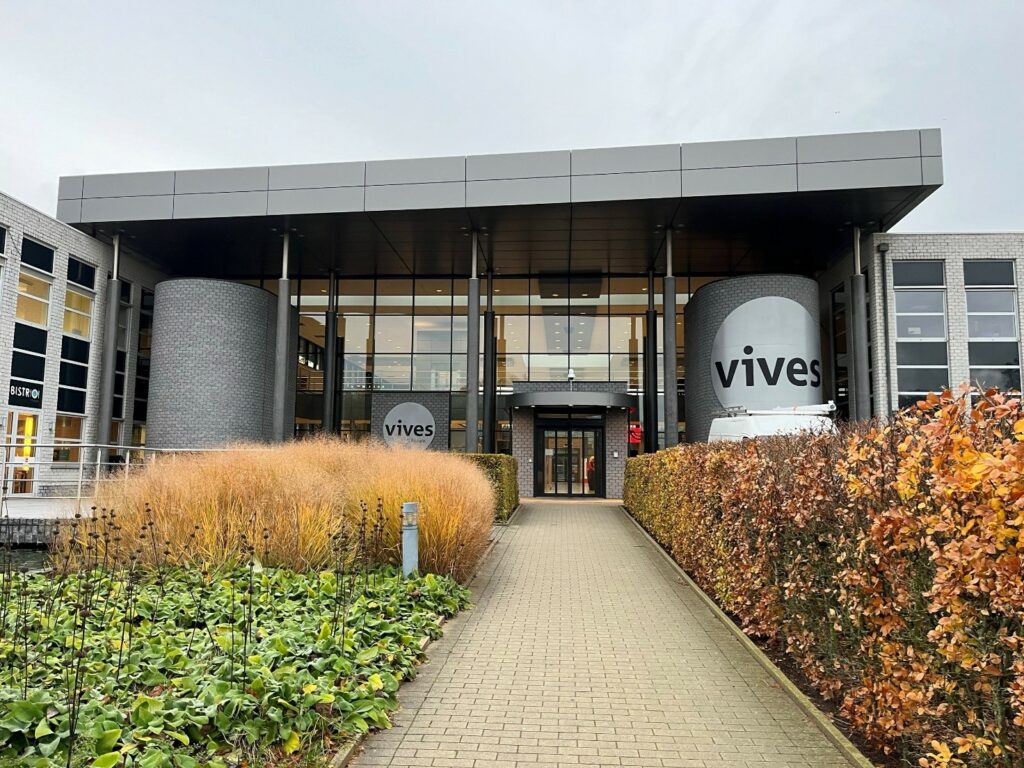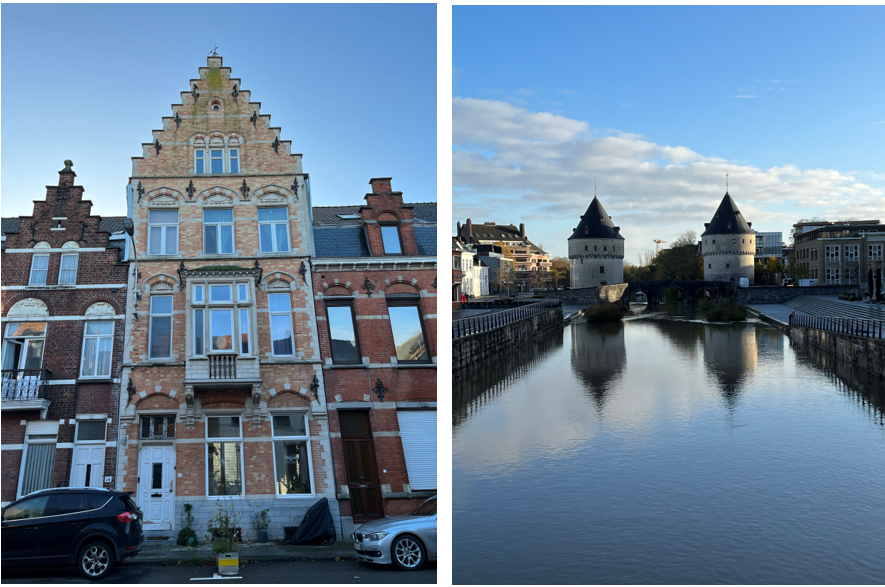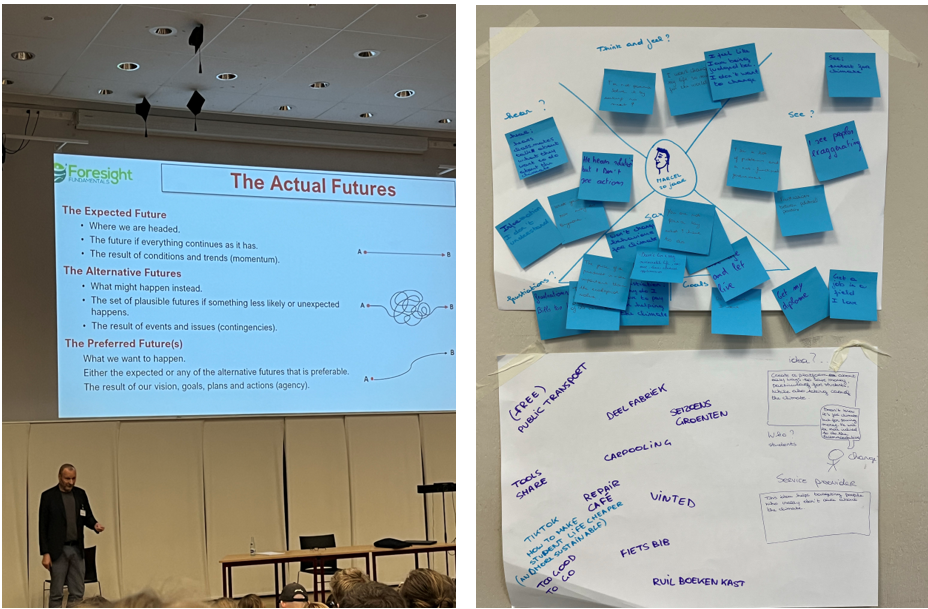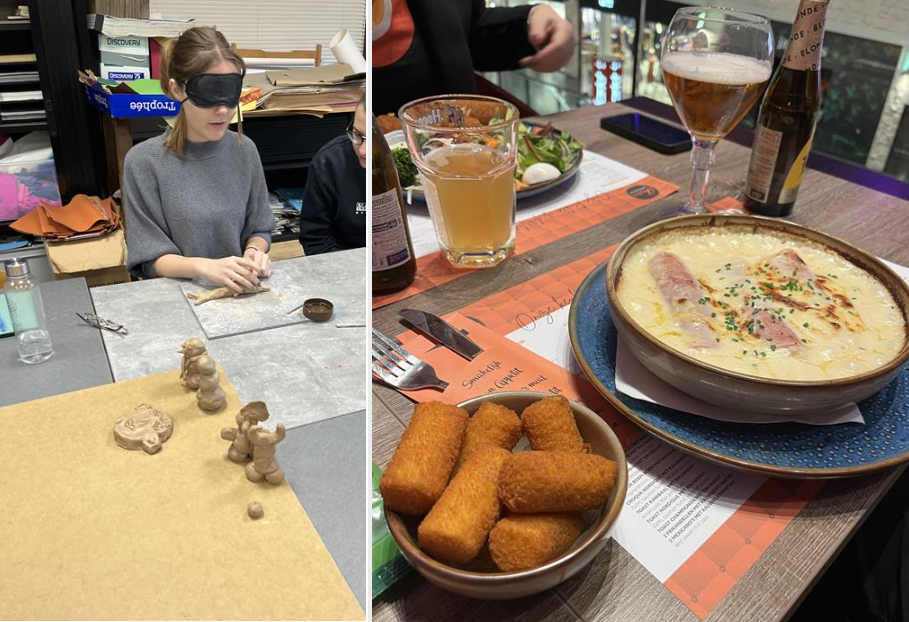A western Belgian town Kortrijk played a host to Vives University of Applied Sciences’ International Week in November 2023. The week was full of insightful workshops and meeting new people all around the world. This article summarizes the experiences of this inspiring week.
 Picture 1. Vives University of Applied Sciences campus is Kortrijk. Photo by Outi Loikkanen
Picture 1. Vives University of Applied Sciences campus is Kortrijk. Photo by Outi Loikkanen
The City of Kortrijk and Vives University of Applied Sciences
Kortrijk lies in western Belgium, 1,5 hours by train from Brussels. It dates to the Roman times, being one of the oldest cities in Belgium. Nowadays Kortrijk is a lively town with 79 000 inhabitants, including 8000 students. The main language is Dutch, and the architecture is similar to many Dutch towns. Some of the oldest buildings in town are Broel Towers (pictured below) from 1385. They were built to protect the city and to control traffic through the river Leie. (Tourism Kortijk)
Vives University of Applied Sciences spreads into five different cities in western Belgium. There are 17 000 students, who study applied engineering and technology, applied social studies, biotechnology, commercial sciences, business management and informatics, education and health care (Vives University of Applied Sciences).
 Picture 2. Typical architecture and the Broel towers in Kortrijk. Photos by Outi Loikkanen
Picture 2. Typical architecture and the Broel towers in Kortrijk. Photos by Outi Loikkanen
Global Engagement week
The international week’s theme was global engagement. Global engagement in short means working together with partners, globally engaged for a better world. Engaging internationally gives people, both students and staff, chance to understand global systems and cultural differences and build competencies, which are needed to deal with global challenges. These global challenges, that need all our attention, are for example climate change mitigation, involuntary migration, cyber security, and societal polarization.
The week kicked off with an introduction to Vives Kortrijk and an inspiring speech by Steven Vromman, a Belgian environmental activist and documentarist. Vromman shared his journey of minimizing his ecological footprint, emphasizing individual contributions to a better future—a sentiment echoed in Laurea’s commitment to futures studies.
On the first day we also heard colleagues from Ukraine, Kosovo, and South Africa. Although the conflict situation in Ukraine is difficult, Kosovo is still struggling with post-war reconciliation and the ghosts of apartheid are still there in South Africa, people in all these countries have found resilient practices to cope and go on with their everyday lives. This gives us all hope there are solutions for the global challenges we collectively face.
The whole week was packed with inspirational workshops and lectures held by the international colleagues. We had three people joining from Laurea and we organized service design workshops, showcasing the versatility of service design in addressing global challenges. Participants explored how this method could be applied to solve complex issues.
 Picture 3. Steven Vromman talking about the actual futures and a picture of students’ service design workshop results. Photos by Outi Loikkanen
Picture 3. Steven Vromman talking about the actual futures and a picture of students’ service design workshop results. Photos by Outi Loikkanen
We, the Laurea team, also promoted Finland and Laurea during an international fair. Students were very keen on hearing the opportunities of studying in Finland. What surprised them in general, was that studying in a Finnish University is free of charge, as many European universities charge tuition fees.
I also participated some other workshops. A colleague from the Netherlands talked about intersectionality and made me realize how privileged we Finnish people are, in many ways. Intersectionality means being socially categorized and often discriminated for several reasons like gender, race, class, and religion. For example, if you are a woman of color and a muslim, it is much harder to get a job than a white man in many countries.
Another colleague from Germany held an art workshop, where the participants get to take the role of a disabled artists and their assistants. The artist had to make a clay statue blind folded, and the assistant had to help the artist without interfering too much the art making process. The workshop was partly about accessibility issues, how we need to make art making possible to disabled people. We also need accessible museums, so that everyone can enjoy art. I teach accessibility in the digital world, so it was very interesting to learn from the physical accessibility.
 Picture 4. Art workshop forming clay blind folded, and a typical Belgian dinner of potato croquettes and ham covered asparagus in cream sauce. Photos by Outi Loikkanen
Picture 4. Art workshop forming clay blind folded, and a typical Belgian dinner of potato croquettes and ham covered asparagus in cream sauce. Photos by Outi Loikkanen
The benefits of international exchange
The whole week was about meaningful encounters, meeting new people and learning new perspectives. I learnt many new aspects and concepts. Related to teaching skills, I learnt new activating techniques and built confidence teaching in English. The best part of the week were the people. It is heart warming to notice how many similarities we humans have despite of cultural and language differences. As teachers we all want the best for our students and to find ways to develop ourselves and build networks for future co-operation.
I definitely recommend everyone to take part in international activities. If going abroad is not possible, we also have our own international week in Laurea March 2024 where it is possible to meet global colleagues and build networks.
References